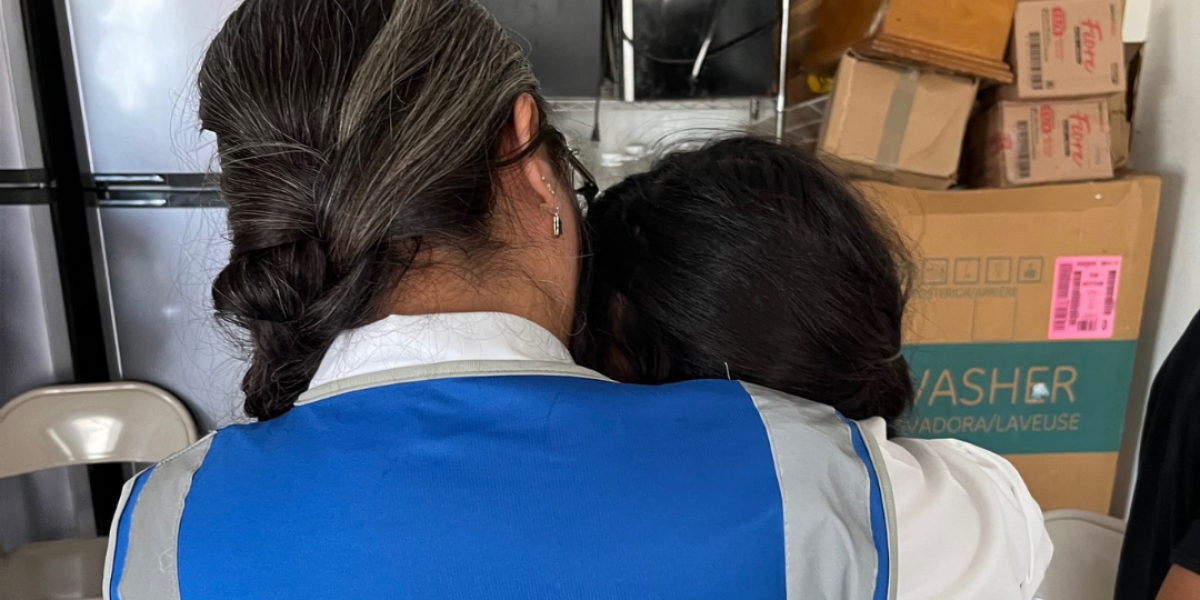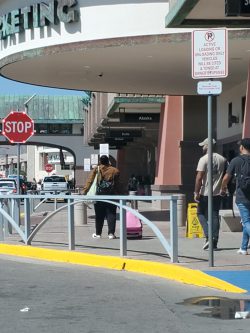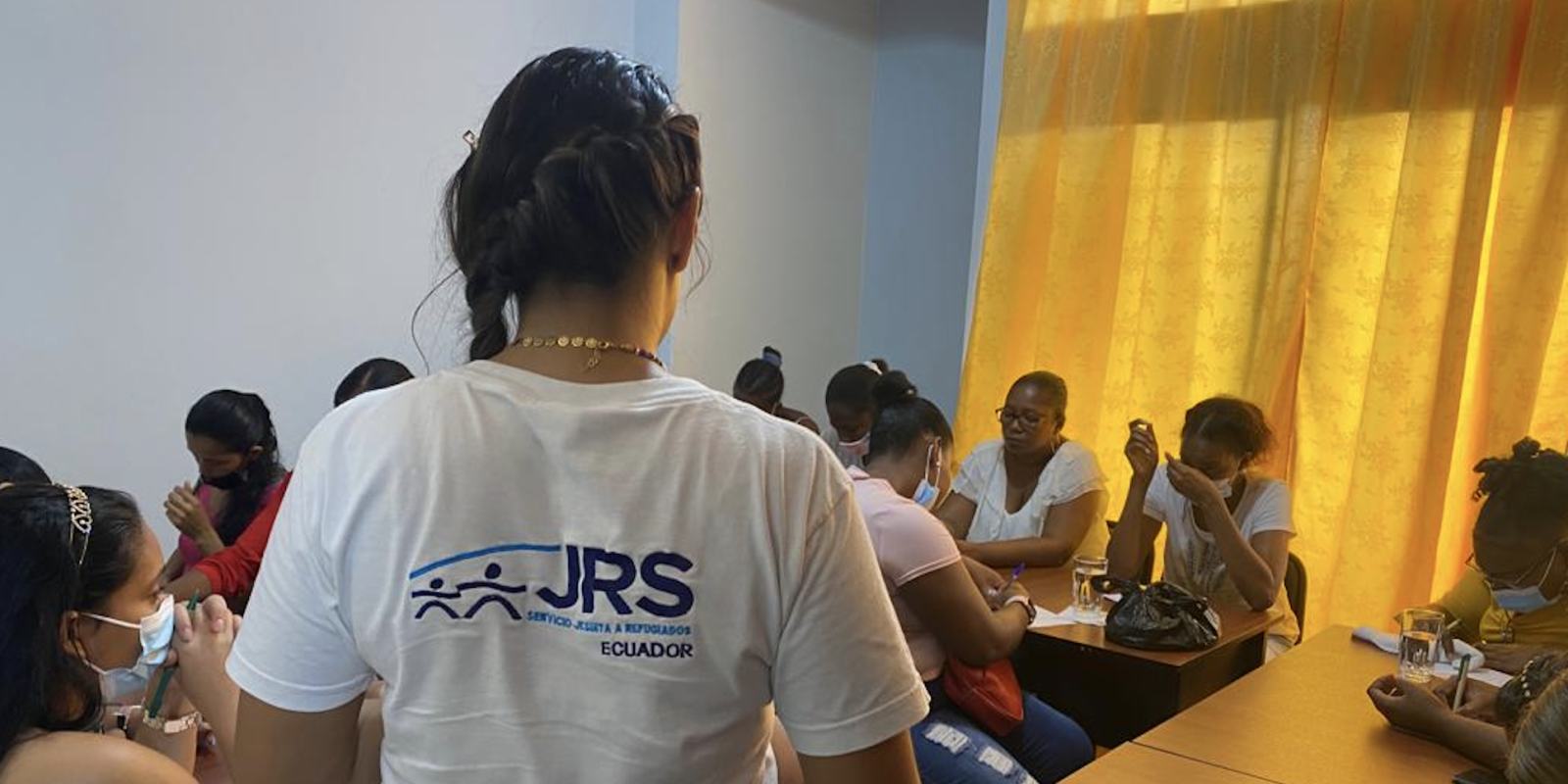Meet Rita, the first person to participate in mental health and psychosocial support at JRS/USA
02 August 2023|Chloe Gunther

This story first appeared in JRS INSIDER, a monthly newsletter including stories of impact across JRS global.
As recent, intensified reports of inhumane treatment from United States Border Officials have emerged, I turned to the JRS/USA Director of Domestic Programs, Maria Sajquim de Torres, PhD to understand the short and long-term mental health consequences of the current immigration system in the US.
She took me back in time to meet the first person JRS accompanied with mental health and psychosocial support (MHPSS) at the US – Mexico Border.
Rita* had just turned thirty when her family fled their home in Central America. She would have gone with them, Maria said, but she was so close to finishing her degree that she decided to stay, with plans to become a teacher.
But, when more members of her extended family were targeted and killed, she realized she had to leave if she wanted to stay alive.
At the same time, Maria had reached out to a local partner in Ciudad Juárez to connect with people in the nearby migrant shelters who could benefit from JRS’s, then new, MHPSS program.
On the outskirts of Cd. Juárez, Maria traveled to an isolated, notoriously dangerous part of town. The shelter where Rita was staying was there.
When Maria met Rita, she was living in a space with five others. This group would become Rita’s primary support system.
Rita had already gone before an immigration judge, but her case was denied. She was devastated. She could not return to her home country or join her family in the US, so Rita had to stay in the shelter.
I asked Maria why her case was denied but she shrugged lightly and shook her head. The decision whether to grant someone asylum in the US can be subjective and unpredictable.
The conditions inside some shelters are unacceptable and some people, like Rita, have to wait here for years.
Rita had left her home country with a psychiatric diagnosis and because Maria did not want to interfere with her treatment plan, she offered to simply accompany Rita and offered to teach her different stress management exercises.
Together, Maria and Rita practiced breathing techniques, emotional freedom techniques (EFT), and different problem-solving exercises.
Eventually, Rita told Maria that she felt confident in the skills they practiced together. She felt comfortable proceeding on her own. So, Maria continued the MHPSS services with other refugees but never forgot about Rita.
But as time continued, Rita was still stuck inside the shelter. To make matters worse, the support system Rita had found within the shelter had all left, having been granted asylum in the US. With losing her friends and experiencing such poor living conditions, Rita’s mental health deteriorated.
One day, Maria saw Rita’s name flash across her phone. Maria picked up.
“Estoy loca.” I am crazy. These were the first words Rita said.
“She said it with such conviction,” Maria recalled. “She really thought she was going crazy.”
When Rita said she needed help, Maria told her she was on her way. Maria met Rita at the shelter. “She was in bad shape,” Maria said.
“I think what was happening was the stress of years of waiting for a solution for her [were wearing her out]. She felt so alone without any support or attention and there was no end in sight for her situation” Maria said.
At the time, the danger surrounding Rita’s shelter had worsened and help for Rita was difficult to find. But, Maria managed to find a doctor that Rita could visit and prescribe the appropriate medication, a difficult feat as health care is not easily accessible for asylum seekers.
“The doctor was such a humane presence to her,” Maria remembered. “He took the time to reassure her and figure out the best plan.”

Rita and Maria started practicing stress management exercises again. With medical assistance, reassurance, and support, Rita’s old personality started to return. She sent a message to Maria after the MHPSS program had ended, explaining what had particularly helped.
“I focused on why [the anxiety and depression] started…It was because everyone was leaving, and I was being left behind. All my friends left. All of that stirred my emotions…I could only ask why am I still here?” She wrote.
On a positive note, Rita and Maria part ways once again.
Some months later, Maria was in El Paso working with migrants when she saw another phone call come in from Rita. She braced herself, hoping for the best but fearing the worst.
“I’m in El Paso!” Rita’s elated voice rang out through the phone.
Rita’s family had paid for an attorney who helped her asylum case, and she was arranging to meet them in the US. She asked Maria how to get to the airport and because she was out and about, Maria immediately offered to go pick her up.
“I was so happy to see her,” Maria said. She watched Rita walk away, towards a safer life, towards reunification with her support system and loved ones.
“Her story shows how much suffering is inflicted on these individuals but also how much these individuals are able to overcome,” Maria said.
Maria keeps in touch with Rita. She reports that Rita is doing well and continues to practice the breathing exercises and EFT she learned.
There are hundreds of thousands of people waiting in limbo like Rita did. Your contributions, whether through donations, advocacy, or service, help Maria and her team meet more people and continue this lifesaving MHPSS intervention at the US – Mexico Border.
*Name changed for safety



